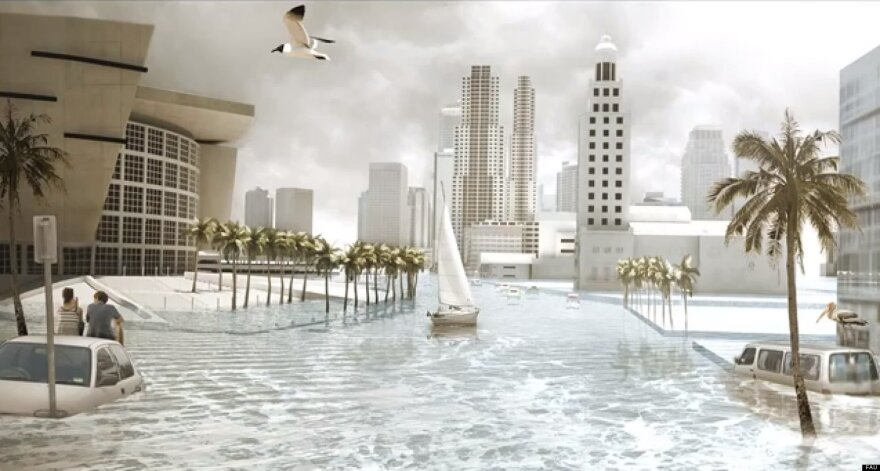A leader must possess imagination. -- Omar Nelson Bradley, Army General, World War II, Korean War
Military leaders depend on imagination. Conflict can spring up anywhere in the world, so leaders must be thinking about every possible scenario, every consequence on action taken or not taken. And that's what a group of retired admirals and generals are asking of political leaders: Have imagination. Consider all the possible consequences of climate change and its impact on the national security of the United States.
The group makes up a military advisory board as part of the CNA Corporation. It recently published a report called National Security and the Accelerating Risks of Climate Change.
We spoke with retired Air Force Lt. Gen. Ken Eickmann, who now serves as deputy director for the Center for Energy Security at the University of Texas, Austin.
The board is made up of retired senior admirals and generals from the Army, Navy, Air Force and Marine Corps. They study current pressing issues and their impact on America's national security. They also look at the links between energy policy, climate change and national security.
Read more from Eickmann below.
What is a current global incident that best explains how climate change is a national security threat?
In Africa, Asia and the Middle East we see prolonged droughts and flooding, which has led to food shortages and mass migration. Look at the case in Syria. Severe drought led to water shortages, which led to increased food prices. That played a role in deteriorating economic conditions and intensifying political. It didn't create the current situation in Syria, but it exacerbated the conditions by creating an environment where terrorism can flourish.
You didn't always believe in man-made climate change. What changed your mind?
A few years ago, I was not a believer. But, as I usually do, I try to gather enough information to debate [people]. But, as I gathered data to make my case, it soon became obvious that there's a great deal of evidence that makes it hard to refute the existence of climate change. If people will look at all the data available they will come to the same conclusion.
Who most often argued with you about climate change?
My wife. We've been married for 47 years. We've always been able to discuss the issues, and we don't always agree. But, we respect each other's opinion and had some great conversations on this topic.
Considering those conversations, what do you say to politicians?
I tell them to look carefully at the data and make informed decisions. We can't afford to get this wrong. The U.S. National Intelligence Council assesses that within the next 20 years the world's population will increase from 7.1 billion to 8 billion. In light of the projected climate change, stresses on the water, food and energy nexus are mounting security concerns across the world.
"When it comes to thinking about the way the world will respond to projected changes in the climate, we believe it's important to guard against a failure of imagination." This is a quote in the report. What does it mean?
You need to think of all the possibilities. In a military environment, we never have a hundred percent certainty, and we have contingency plans for any type of scenario anywhere in the world we need to respond to. This particular quote refers back to the 9-11 Commission Report. It was found that the most significant failure was one of imagination. We [believe] leaders did not understand the gravity of the threat. We cannot afford the potential threat of climate change.
How is our military impacted by climate change here at home, at the training bases?
Look at Central Texas. The use of live rounds and tracer rounds at Fort Hood was suspended a few years ago. This forced leaders to use helicopters to drench the area with water so soldiers could train, because if you can't train with live ammunition, that certainly impacts training. Many training installations have had training days reduced by more severe storms.
What geographical locations where climate change could exacerbate political, social or economic unrest could eventually become a national security issue for the U.S.?
By 2025, about 40 percent of the world's population will be living in countries experiencing water shortages. If the projections made by the International Panel on Climate Change are correct, then we have a number of countries in trouble. Bangladesh is one. It's one of the most densely populated countries in the world with about 20 million [living] within three feet of sea level. In other words, rising sea levels could lead to mass migration. Look at the Mekong Delta. It produces most of the rice consumed by Southeast Asia. If the projections of sea level are correct, one half the land mass of the Mekong Delta would be underwater by the end of the century.
How do you talk to Congress, especially those on Capitol Hill who still debate the reality of man-made climate change?
Recently Admiral Samuel Locklear has come on strongly about the potential impacts of climate change. He recently said that he sees climate change as the Pacific region's biggest long-term security threat. Climate change is probably the most likely thing that is going to happen that will cripple the security environment in the Pacific. Probably more likely than any other scenario than we talk about. When he said that recently in a congressional hearing, it raised some eyebrows. At least they're will to look at it. I think the discussion is continuing.






